Entrepreneurship and Small Business Report: An Economic Analysis
VerifiedAdded on 2020/12/09
|17
|4813
|69
Report
AI Summary
This report provides a comprehensive overview of entrepreneurship and small businesses, examining different types of entrepreneurial ventures and their relationship to entrepreneurial typologies. It analyzes the significant impact of micro and small businesses on the UK economy, including their contribution to employment and economic growth. The report also explores the influence of Brexit on small firms and start-ups, highlighting their role in fostering social and economic development. Furthermore, it delves into the characteristics, traits, and skills of successful entrepreneurs, differentiating them from business managers, and assessing how their backgrounds and experiences shape their entrepreneurial journeys. The report emphasizes the importance of small businesses in generating employment, contributing to local, regional, and national economies, and fostering innovation, offering valuable insights into the dynamics of entrepreneurship and its impact on the broader economic landscape.

ENTREPRENEURSHIP
AND SMALL BUSINESS
AND SMALL BUSINESS
Paraphrase This Document
Need a fresh take? Get an instant paraphrase of this document with our AI Paraphraser
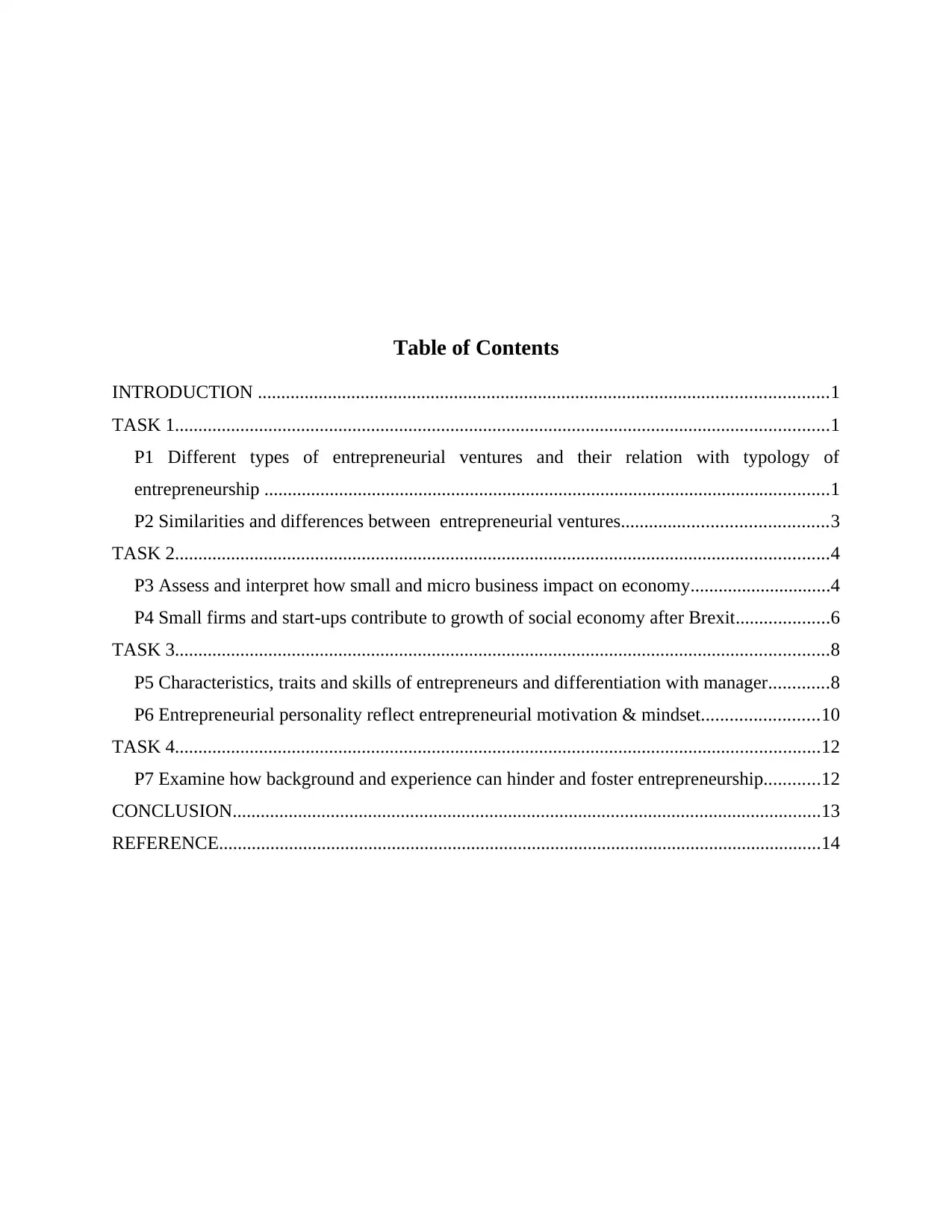
Table of Contents
INTRODUCTION ..........................................................................................................................1
TASK 1............................................................................................................................................1
P1 Different types of entrepreneurial ventures and their relation with typology of
entrepreneurship .........................................................................................................................1
P2 Similarities and differences between entrepreneurial ventures............................................3
TASK 2............................................................................................................................................4
P3 Assess and interpret how small and micro business impact on economy..............................4
P4 Small firms and start-ups contribute to growth of social economy after Brexit....................6
TASK 3............................................................................................................................................8
P5 Characteristics, traits and skills of entrepreneurs and differentiation with manager.............8
P6 Entrepreneurial personality reflect entrepreneurial motivation & mindset.........................10
TASK 4..........................................................................................................................................12
P7 Examine how background and experience can hinder and foster entrepreneurship............12
CONCLUSION..............................................................................................................................13
REFERENCE.................................................................................................................................14
INTRODUCTION ..........................................................................................................................1
TASK 1............................................................................................................................................1
P1 Different types of entrepreneurial ventures and their relation with typology of
entrepreneurship .........................................................................................................................1
P2 Similarities and differences between entrepreneurial ventures............................................3
TASK 2............................................................................................................................................4
P3 Assess and interpret how small and micro business impact on economy..............................4
P4 Small firms and start-ups contribute to growth of social economy after Brexit....................6
TASK 3............................................................................................................................................8
P5 Characteristics, traits and skills of entrepreneurs and differentiation with manager.............8
P6 Entrepreneurial personality reflect entrepreneurial motivation & mindset.........................10
TASK 4..........................................................................................................................................12
P7 Examine how background and experience can hinder and foster entrepreneurship............12
CONCLUSION..............................................................................................................................13
REFERENCE.................................................................................................................................14
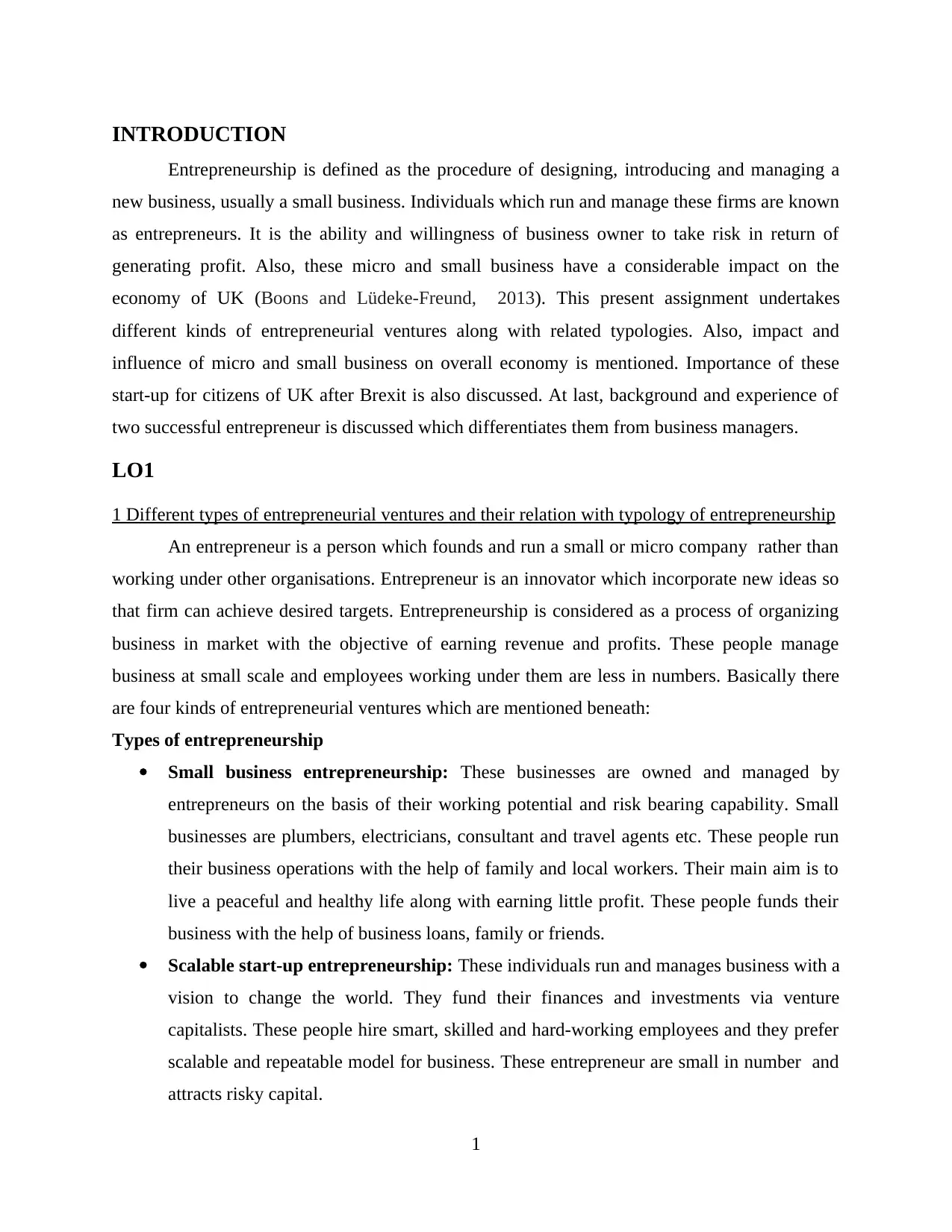
INTRODUCTION
Entrepreneurship is defined as the procedure of designing, introducing and managing a
new business, usually a small business. Individuals which run and manage these firms are known
as entrepreneurs. It is the ability and willingness of business owner to take risk in return of
generating profit. Also, these micro and small business have a considerable impact on the
economy of UK (Boons and Lüdeke-Freund, 2013). This present assignment undertakes
different kinds of entrepreneurial ventures along with related typologies. Also, impact and
influence of micro and small business on overall economy is mentioned. Importance of these
start-up for citizens of UK after Brexit is also discussed. At last, background and experience of
two successful entrepreneur is discussed which differentiates them from business managers.
LO1
1 Different types of entrepreneurial ventures and their relation with typology of entrepreneurship
An entrepreneur is a person which founds and run a small or micro company rather than
working under other organisations. Entrepreneur is an innovator which incorporate new ideas so
that firm can achieve desired targets. Entrepreneurship is considered as a process of organizing
business in market with the objective of earning revenue and profits. These people manage
business at small scale and employees working under them are less in numbers. Basically there
are four kinds of entrepreneurial ventures which are mentioned beneath:
Types of entrepreneurship
Small business entrepreneurship: These businesses are owned and managed by
entrepreneurs on the basis of their working potential and risk bearing capability. Small
businesses are plumbers, electricians, consultant and travel agents etc. These people run
their business operations with the help of family and local workers. Their main aim is to
live a peaceful and healthy life along with earning little profit. These people funds their
business with the help of business loans, family or friends.
Scalable start-up entrepreneurship: These individuals run and manages business with a
vision to change the world. They fund their finances and investments via venture
capitalists. These people hire smart, skilled and hard-working employees and they prefer
scalable and repeatable model for business. These entrepreneur are small in number and
attracts risky capital.
1
Entrepreneurship is defined as the procedure of designing, introducing and managing a
new business, usually a small business. Individuals which run and manage these firms are known
as entrepreneurs. It is the ability and willingness of business owner to take risk in return of
generating profit. Also, these micro and small business have a considerable impact on the
economy of UK (Boons and Lüdeke-Freund, 2013). This present assignment undertakes
different kinds of entrepreneurial ventures along with related typologies. Also, impact and
influence of micro and small business on overall economy is mentioned. Importance of these
start-up for citizens of UK after Brexit is also discussed. At last, background and experience of
two successful entrepreneur is discussed which differentiates them from business managers.
LO1
1 Different types of entrepreneurial ventures and their relation with typology of entrepreneurship
An entrepreneur is a person which founds and run a small or micro company rather than
working under other organisations. Entrepreneur is an innovator which incorporate new ideas so
that firm can achieve desired targets. Entrepreneurship is considered as a process of organizing
business in market with the objective of earning revenue and profits. These people manage
business at small scale and employees working under them are less in numbers. Basically there
are four kinds of entrepreneurial ventures which are mentioned beneath:
Types of entrepreneurship
Small business entrepreneurship: These businesses are owned and managed by
entrepreneurs on the basis of their working potential and risk bearing capability. Small
businesses are plumbers, electricians, consultant and travel agents etc. These people run
their business operations with the help of family and local workers. Their main aim is to
live a peaceful and healthy life along with earning little profit. These people funds their
business with the help of business loans, family or friends.
Scalable start-up entrepreneurship: These individuals run and manages business with a
vision to change the world. They fund their finances and investments via venture
capitalists. These people hire smart, skilled and hard-working employees and they prefer
scalable and repeatable model for business. These entrepreneur are small in number and
attracts risky capital.
1
⊘ This is a preview!⊘
Do you want full access?
Subscribe today to unlock all pages.

Trusted by 1+ million students worldwide
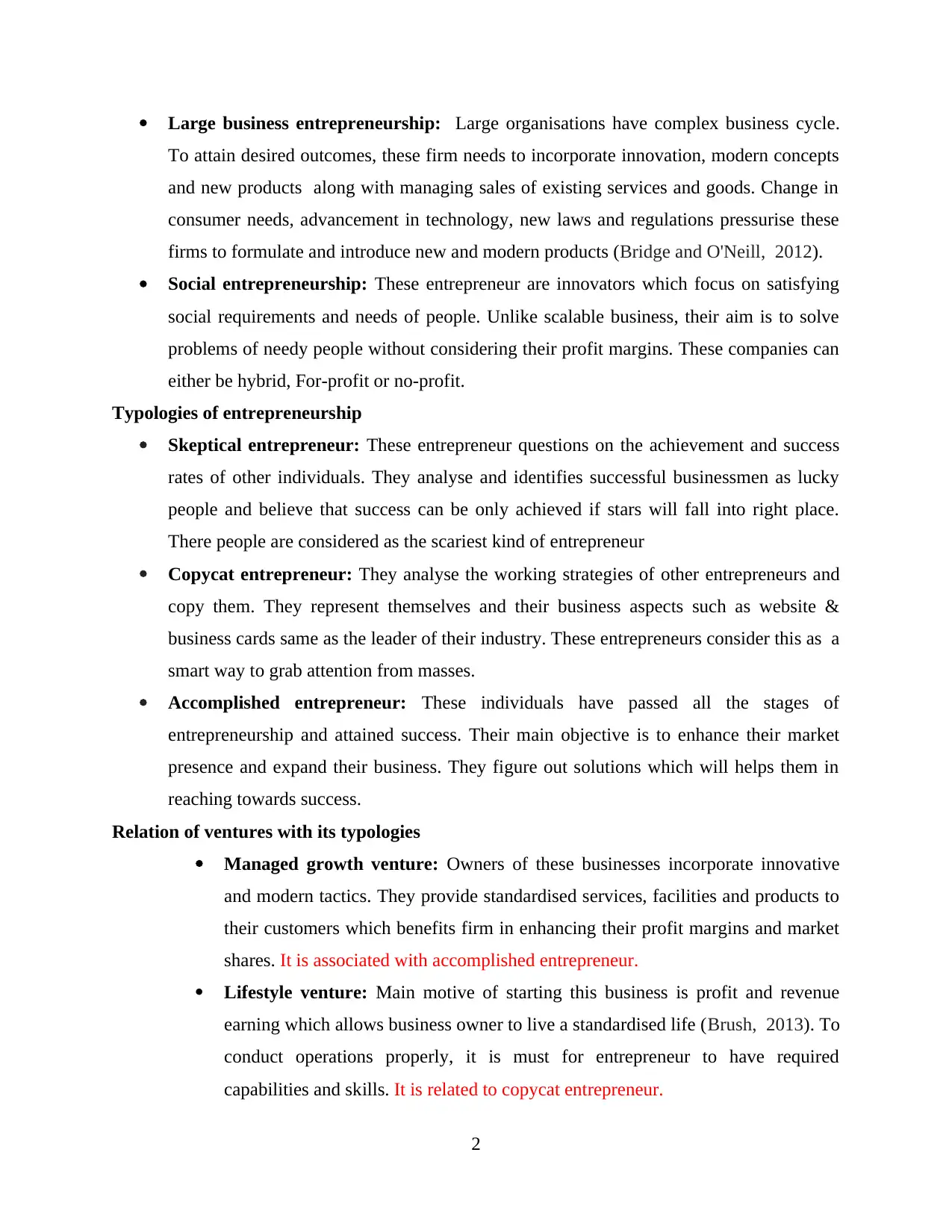
Large business entrepreneurship: Large organisations have complex business cycle.
To attain desired outcomes, these firm needs to incorporate innovation, modern concepts
and new products along with managing sales of existing services and goods. Change in
consumer needs, advancement in technology, new laws and regulations pressurise these
firms to formulate and introduce new and modern products (Bridge and O'Neill, 2012).
Social entrepreneurship: These entrepreneur are innovators which focus on satisfying
social requirements and needs of people. Unlike scalable business, their aim is to solve
problems of needy people without considering their profit margins. These companies can
either be hybrid, For-profit or no-profit.
Typologies of entrepreneurship
Skeptical entrepreneur: These entrepreneur questions on the achievement and success
rates of other individuals. They analyse and identifies successful businessmen as lucky
people and believe that success can be only achieved if stars will fall into right place.
There people are considered as the scariest kind of entrepreneur
Copycat entrepreneur: They analyse the working strategies of other entrepreneurs and
copy them. They represent themselves and their business aspects such as website &
business cards same as the leader of their industry. These entrepreneurs consider this as a
smart way to grab attention from masses.
Accomplished entrepreneur: These individuals have passed all the stages of
entrepreneurship and attained success. Their main objective is to enhance their market
presence and expand their business. They figure out solutions which will helps them in
reaching towards success.
Relation of ventures with its typologies
Managed growth venture: Owners of these businesses incorporate innovative
and modern tactics. They provide standardised services, facilities and products to
their customers which benefits firm in enhancing their profit margins and market
shares. It is associated with accomplished entrepreneur.
Lifestyle venture: Main motive of starting this business is profit and revenue
earning which allows business owner to live a standardised life (Brush, 2013). To
conduct operations properly, it is must for entrepreneur to have required
capabilities and skills. It is related to copycat entrepreneur.
2
To attain desired outcomes, these firm needs to incorporate innovation, modern concepts
and new products along with managing sales of existing services and goods. Change in
consumer needs, advancement in technology, new laws and regulations pressurise these
firms to formulate and introduce new and modern products (Bridge and O'Neill, 2012).
Social entrepreneurship: These entrepreneur are innovators which focus on satisfying
social requirements and needs of people. Unlike scalable business, their aim is to solve
problems of needy people without considering their profit margins. These companies can
either be hybrid, For-profit or no-profit.
Typologies of entrepreneurship
Skeptical entrepreneur: These entrepreneur questions on the achievement and success
rates of other individuals. They analyse and identifies successful businessmen as lucky
people and believe that success can be only achieved if stars will fall into right place.
There people are considered as the scariest kind of entrepreneur
Copycat entrepreneur: They analyse the working strategies of other entrepreneurs and
copy them. They represent themselves and their business aspects such as website &
business cards same as the leader of their industry. These entrepreneurs consider this as a
smart way to grab attention from masses.
Accomplished entrepreneur: These individuals have passed all the stages of
entrepreneurship and attained success. Their main objective is to enhance their market
presence and expand their business. They figure out solutions which will helps them in
reaching towards success.
Relation of ventures with its typologies
Managed growth venture: Owners of these businesses incorporate innovative
and modern tactics. They provide standardised services, facilities and products to
their customers which benefits firm in enhancing their profit margins and market
shares. It is associated with accomplished entrepreneur.
Lifestyle venture: Main motive of starting this business is profit and revenue
earning which allows business owner to live a standardised life (Brush, 2013). To
conduct operations properly, it is must for entrepreneur to have required
capabilities and skills. It is related to copycat entrepreneur.
2
Paraphrase This Document
Need a fresh take? Get an instant paraphrase of this document with our AI Paraphraser
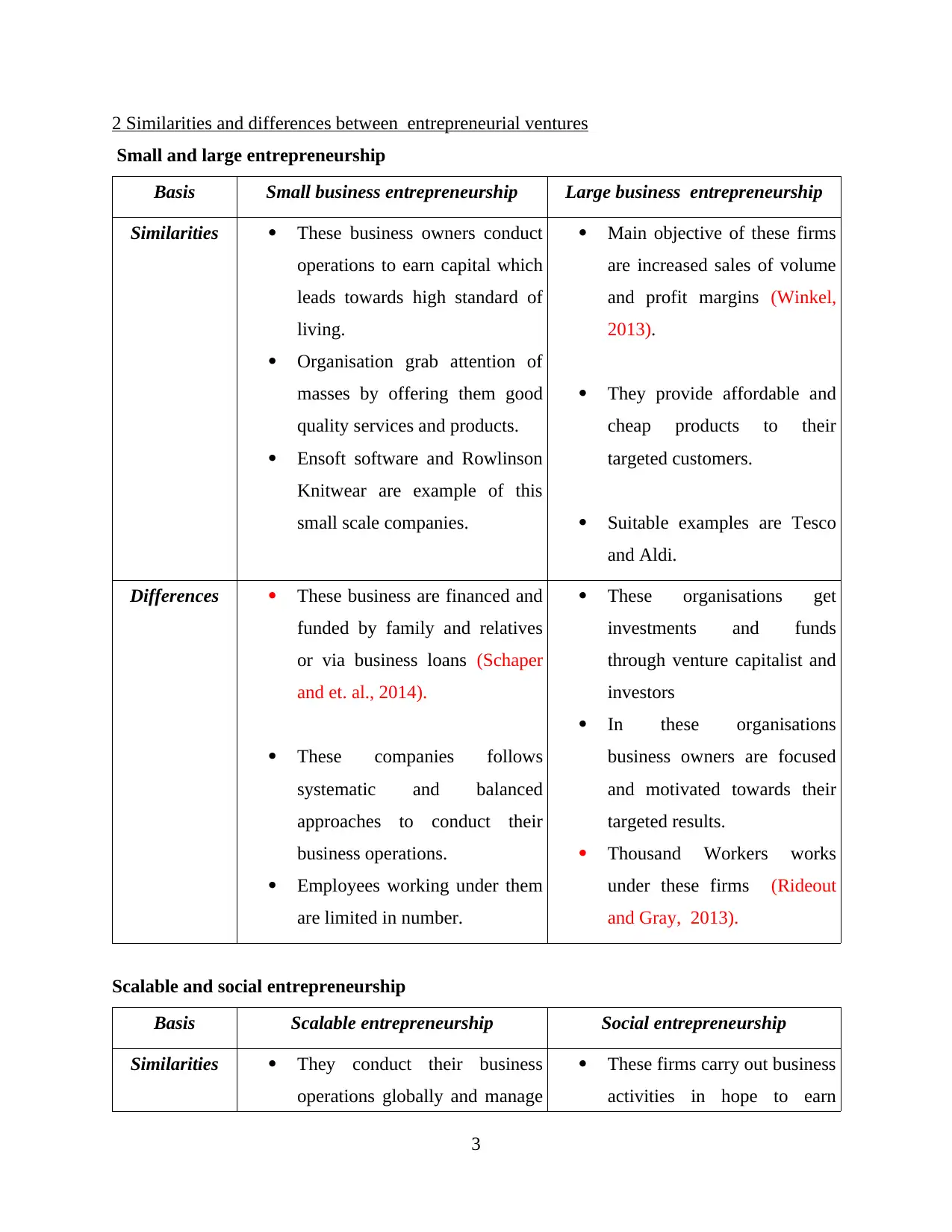
2 Similarities and differences between entrepreneurial ventures
Small and large entrepreneurship
Basis Small business entrepreneurship Large business entrepreneurship
Similarities These business owners conduct
operations to earn capital which
leads towards high standard of
living.
Organisation grab attention of
masses by offering them good
quality services and products.
Ensoft software and Rowlinson
Knitwear are example of this
small scale companies.
Main objective of these firms
are increased sales of volume
and profit margins (Winkel,
2013).
They provide affordable and
cheap products to their
targeted customers.
Suitable examples are Tesco
and Aldi.
Differences These business are financed and
funded by family and relatives
or via business loans (Schaper
and et. al., 2014).
These companies follows
systematic and balanced
approaches to conduct their
business operations.
Employees working under them
are limited in number.
These organisations get
investments and funds
through venture capitalist and
investors
In these organisations
business owners are focused
and motivated towards their
targeted results.
Thousand Workers works
under these firms (Rideout
and Gray, 2013).
Scalable and social entrepreneurship
Basis Scalable entrepreneurship Social entrepreneurship
Similarities They conduct their business
operations globally and manage
These firms carry out business
activities in hope to earn
3
Small and large entrepreneurship
Basis Small business entrepreneurship Large business entrepreneurship
Similarities These business owners conduct
operations to earn capital which
leads towards high standard of
living.
Organisation grab attention of
masses by offering them good
quality services and products.
Ensoft software and Rowlinson
Knitwear are example of this
small scale companies.
Main objective of these firms
are increased sales of volume
and profit margins (Winkel,
2013).
They provide affordable and
cheap products to their
targeted customers.
Suitable examples are Tesco
and Aldi.
Differences These business are financed and
funded by family and relatives
or via business loans (Schaper
and et. al., 2014).
These companies follows
systematic and balanced
approaches to conduct their
business operations.
Employees working under them
are limited in number.
These organisations get
investments and funds
through venture capitalist and
investors
In these organisations
business owners are focused
and motivated towards their
targeted results.
Thousand Workers works
under these firms (Rideout
and Gray, 2013).
Scalable and social entrepreneurship
Basis Scalable entrepreneurship Social entrepreneurship
Similarities They conduct their business
operations globally and manage
These firms carry out business
activities in hope to earn
3
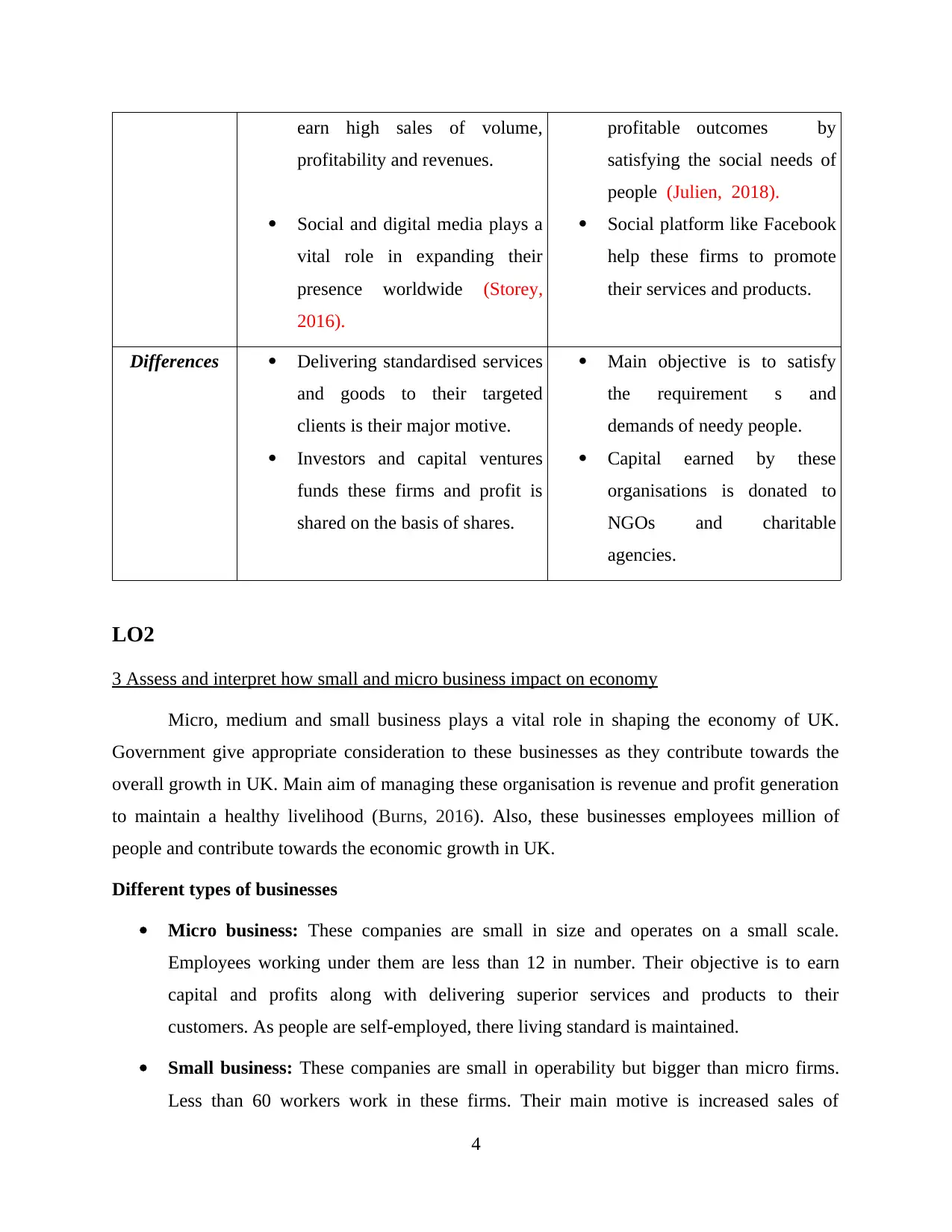
earn high sales of volume,
profitability and revenues.
Social and digital media plays a
vital role in expanding their
presence worldwide (Storey,
2016).
profitable outcomes by
satisfying the social needs of
people (Julien, 2018).
Social platform like Facebook
help these firms to promote
their services and products.
Differences Delivering standardised services
and goods to their targeted
clients is their major motive.
Investors and capital ventures
funds these firms and profit is
shared on the basis of shares.
Main objective is to satisfy
the requirement s and
demands of needy people.
Capital earned by these
organisations is donated to
NGOs and charitable
agencies.
LO2
3 Assess and interpret how small and micro business impact on economy
Micro, medium and small business plays a vital role in shaping the economy of UK.
Government give appropriate consideration to these businesses as they contribute towards the
overall growth in UK. Main aim of managing these organisation is revenue and profit generation
to maintain a healthy livelihood (Burns, 2016). Also, these businesses employees million of
people and contribute towards the economic growth in UK.
Different types of businesses
Micro business: These companies are small in size and operates on a small scale.
Employees working under them are less than 12 in number. Their objective is to earn
capital and profits along with delivering superior services and products to their
customers. As people are self-employed, there living standard is maintained.
Small business: These companies are small in operability but bigger than micro firms.
Less than 60 workers work in these firms. Their main motive is increased sales of
4
profitability and revenues.
Social and digital media plays a
vital role in expanding their
presence worldwide (Storey,
2016).
profitable outcomes by
satisfying the social needs of
people (Julien, 2018).
Social platform like Facebook
help these firms to promote
their services and products.
Differences Delivering standardised services
and goods to their targeted
clients is their major motive.
Investors and capital ventures
funds these firms and profit is
shared on the basis of shares.
Main objective is to satisfy
the requirement s and
demands of needy people.
Capital earned by these
organisations is donated to
NGOs and charitable
agencies.
LO2
3 Assess and interpret how small and micro business impact on economy
Micro, medium and small business plays a vital role in shaping the economy of UK.
Government give appropriate consideration to these businesses as they contribute towards the
overall growth in UK. Main aim of managing these organisation is revenue and profit generation
to maintain a healthy livelihood (Burns, 2016). Also, these businesses employees million of
people and contribute towards the economic growth in UK.
Different types of businesses
Micro business: These companies are small in size and operates on a small scale.
Employees working under them are less than 12 in number. Their objective is to earn
capital and profits along with delivering superior services and products to their
customers. As people are self-employed, there living standard is maintained.
Small business: These companies are small in operability but bigger than micro firms.
Less than 60 workers work in these firms. Their main motive is increased sales of
4
⊘ This is a preview!⊘
Do you want full access?
Subscribe today to unlock all pages.

Trusted by 1+ million students worldwide
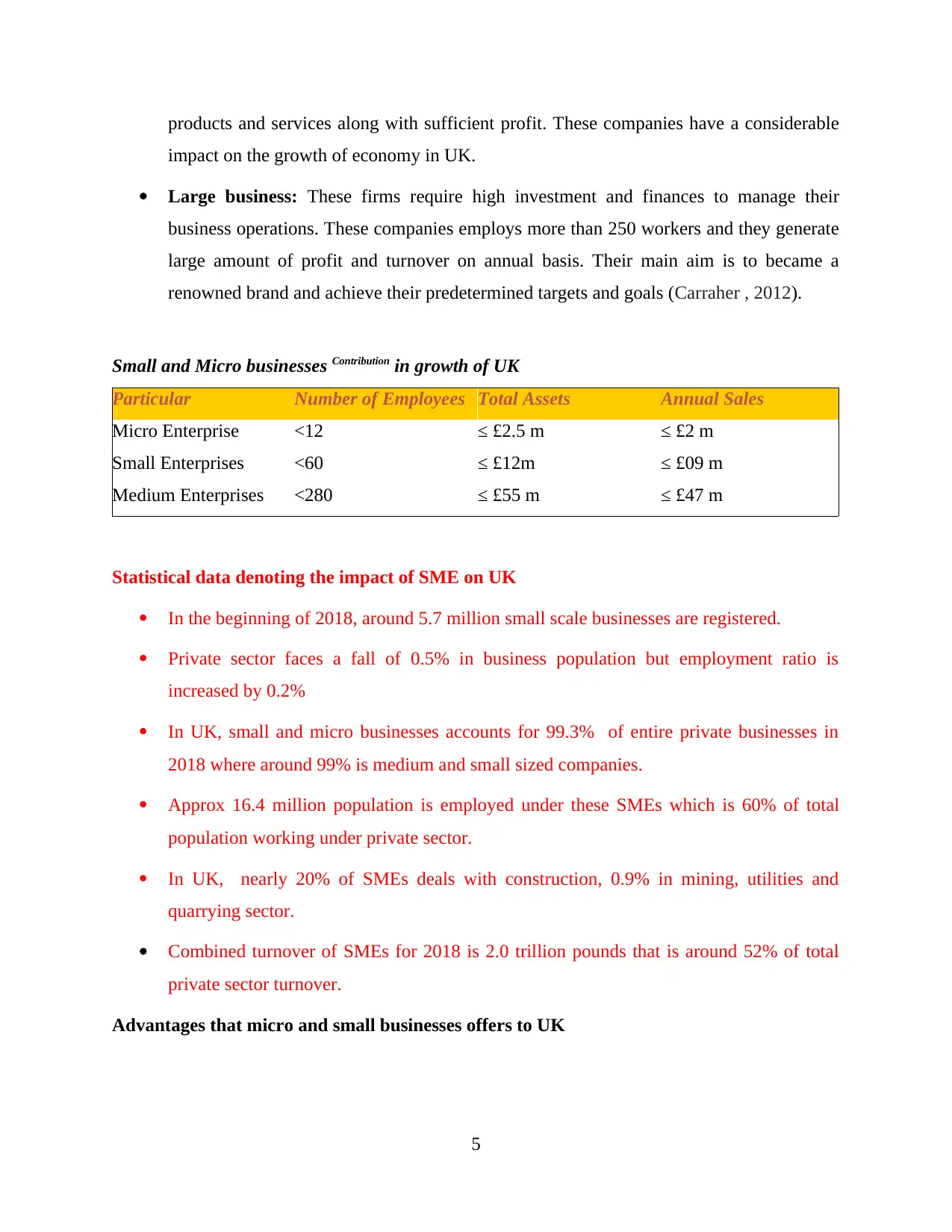
products and services along with sufficient profit. These companies have a considerable
impact on the growth of economy in UK.
Large business: These firms require high investment and finances to manage their
business operations. These companies employs more than 250 workers and they generate
large amount of profit and turnover on annual basis. Their main aim is to became a
renowned brand and achieve their predetermined targets and goals (Carraher , 2012).
Small and Micro businesses Contribution in growth of UK
Particular Number of Employees Total Assets Annual Sales
Micro Enterprise <12 ≤ £2.5 m ≤ £2 m
Small Enterprises <60 ≤ £12m ≤ £09 m
Medium Enterprises <280 ≤ £55 m ≤ £47 m
Statistical data denoting the impact of SME on UK
In the beginning of 2018, around 5.7 million small scale businesses are registered.
Private sector faces a fall of 0.5% in business population but employment ratio is
increased by 0.2%
In UK, small and micro businesses accounts for 99.3% of entire private businesses in
2018 where around 99% is medium and small sized companies.
Approx 16.4 million population is employed under these SMEs which is 60% of total
population working under private sector.
In UK, nearly 20% of SMEs deals with construction, 0.9% in mining, utilities and
quarrying sector.
Combined turnover of SMEs for 2018 is 2.0 trillion pounds that is around 52% of total
private sector turnover.
Advantages that micro and small businesses offers to UK
5
impact on the growth of economy in UK.
Large business: These firms require high investment and finances to manage their
business operations. These companies employs more than 250 workers and they generate
large amount of profit and turnover on annual basis. Their main aim is to became a
renowned brand and achieve their predetermined targets and goals (Carraher , 2012).
Small and Micro businesses Contribution in growth of UK
Particular Number of Employees Total Assets Annual Sales
Micro Enterprise <12 ≤ £2.5 m ≤ £2 m
Small Enterprises <60 ≤ £12m ≤ £09 m
Medium Enterprises <280 ≤ £55 m ≤ £47 m
Statistical data denoting the impact of SME on UK
In the beginning of 2018, around 5.7 million small scale businesses are registered.
Private sector faces a fall of 0.5% in business population but employment ratio is
increased by 0.2%
In UK, small and micro businesses accounts for 99.3% of entire private businesses in
2018 where around 99% is medium and small sized companies.
Approx 16.4 million population is employed under these SMEs which is 60% of total
population working under private sector.
In UK, nearly 20% of SMEs deals with construction, 0.9% in mining, utilities and
quarrying sector.
Combined turnover of SMEs for 2018 is 2.0 trillion pounds that is around 52% of total
private sector turnover.
Advantages that micro and small businesses offers to UK
5
Paraphrase This Document
Need a fresh take? Get an instant paraphrase of this document with our AI Paraphraser

Employment generation: These firms provide job opportunists to hundreds of people.
As people managing these firms are self-employed, issues like poverty and low living
standard doesn't impact the overall growth of people in UK.
Finances are easy to forecast: A small and financial stable business requires less
revenue. High growth results in increased cost and expanses which are difficult to
manage. Less financial stress results in happy and balanced livelihood.
Impact of SMEs on budget of UK:
Local impact: These companies have an advantageous impact on the economy of UK
because of employment opportunities it provides. Capable individuals are hired and
payed as per their skills and talent (Duval‐Couetil, 2013). Hence, local citizens are able to
manage their expenses without depending on others.
Regional impact: These firms have a positive impact on regional level. People are highly
satisfied with the facilities and services provided by these firms. These companies target
particular section in UK and provide their products and services in accordance with the
requirement and needs of their potential customers. This helps these companies to
manage their finances and profit margins.
National impact: Small businesses carter the needs and requirements of people in UK as
their priority. This makes them popular and efficient which benefits them in
communicating and dealing with customers outside UK also. This impacts UK economy
positively as overall economic growth of country enhances.
4 Small firms and start-ups contribute to growth of social economy after Brexit
Brexit is exit of Britain from European union. Britain took this decision in 2016 after
acknowledging the consent of people in UK via voting. As per the results, around 55% citizens
in UK was in favour of withdrawal. Due to Brexit, now UK is free to regulate its laws and
policies as per the requirement, no other country can interfere in working of UK.
After Brexit, government in UK provides considerable support to SMEs by investing in
them. Government formulates flexible and liberal policies which allows SMEs to manage their
business operations effectively. As sufficient funds are provided by government, large number of
6
As people managing these firms are self-employed, issues like poverty and low living
standard doesn't impact the overall growth of people in UK.
Finances are easy to forecast: A small and financial stable business requires less
revenue. High growth results in increased cost and expanses which are difficult to
manage. Less financial stress results in happy and balanced livelihood.
Impact of SMEs on budget of UK:
Local impact: These companies have an advantageous impact on the economy of UK
because of employment opportunities it provides. Capable individuals are hired and
payed as per their skills and talent (Duval‐Couetil, 2013). Hence, local citizens are able to
manage their expenses without depending on others.
Regional impact: These firms have a positive impact on regional level. People are highly
satisfied with the facilities and services provided by these firms. These companies target
particular section in UK and provide their products and services in accordance with the
requirement and needs of their potential customers. This helps these companies to
manage their finances and profit margins.
National impact: Small businesses carter the needs and requirements of people in UK as
their priority. This makes them popular and efficient which benefits them in
communicating and dealing with customers outside UK also. This impacts UK economy
positively as overall economic growth of country enhances.
4 Small firms and start-ups contribute to growth of social economy after Brexit
Brexit is exit of Britain from European union. Britain took this decision in 2016 after
acknowledging the consent of people in UK via voting. As per the results, around 55% citizens
in UK was in favour of withdrawal. Due to Brexit, now UK is free to regulate its laws and
policies as per the requirement, no other country can interfere in working of UK.
After Brexit, government in UK provides considerable support to SMEs by investing in
them. Government formulates flexible and liberal policies which allows SMEs to manage their
business operations effectively. As sufficient funds are provided by government, large number of
6

people set up micro and small businesses which results in job opportunities. Other merits are
mentioned beneath:
Infrastructural development: Tax and custom duties charged by government of UK
leads towards the development of infrastructure. Revenue generated because of these
SMEs is used in maintaining bridges, buildings and roads. Also, remaining amount is
invested in providing welfare to weak and marginalised people due to which population
in UK is highly satisfied with government.
Economic and social development: These micro and small companies provide
standardized facilities and services in UK, which enable citizens to purchase goods
according to their demand and budget. As people are independent and self-employed they
are living high and maintained lifestyle.
Increment in per capita income: People in UK prefer standardized products due to high
living standard. According to the 2017 report, GDP of UK is approx 42516 pounds that is
335% of average global GDP (Loorbach and Wijsman, 2013). This results in increased
annual income of people in UK.
7
mentioned beneath:
Infrastructural development: Tax and custom duties charged by government of UK
leads towards the development of infrastructure. Revenue generated because of these
SMEs is used in maintaining bridges, buildings and roads. Also, remaining amount is
invested in providing welfare to weak and marginalised people due to which population
in UK is highly satisfied with government.
Economic and social development: These micro and small companies provide
standardized facilities and services in UK, which enable citizens to purchase goods
according to their demand and budget. As people are independent and self-employed they
are living high and maintained lifestyle.
Increment in per capita income: People in UK prefer standardized products due to high
living standard. According to the 2017 report, GDP of UK is approx 42516 pounds that is
335% of average global GDP (Loorbach and Wijsman, 2013). This results in increased
annual income of people in UK.
7
⊘ This is a preview!⊘
Do you want full access?
Subscribe today to unlock all pages.

Trusted by 1+ million students worldwide
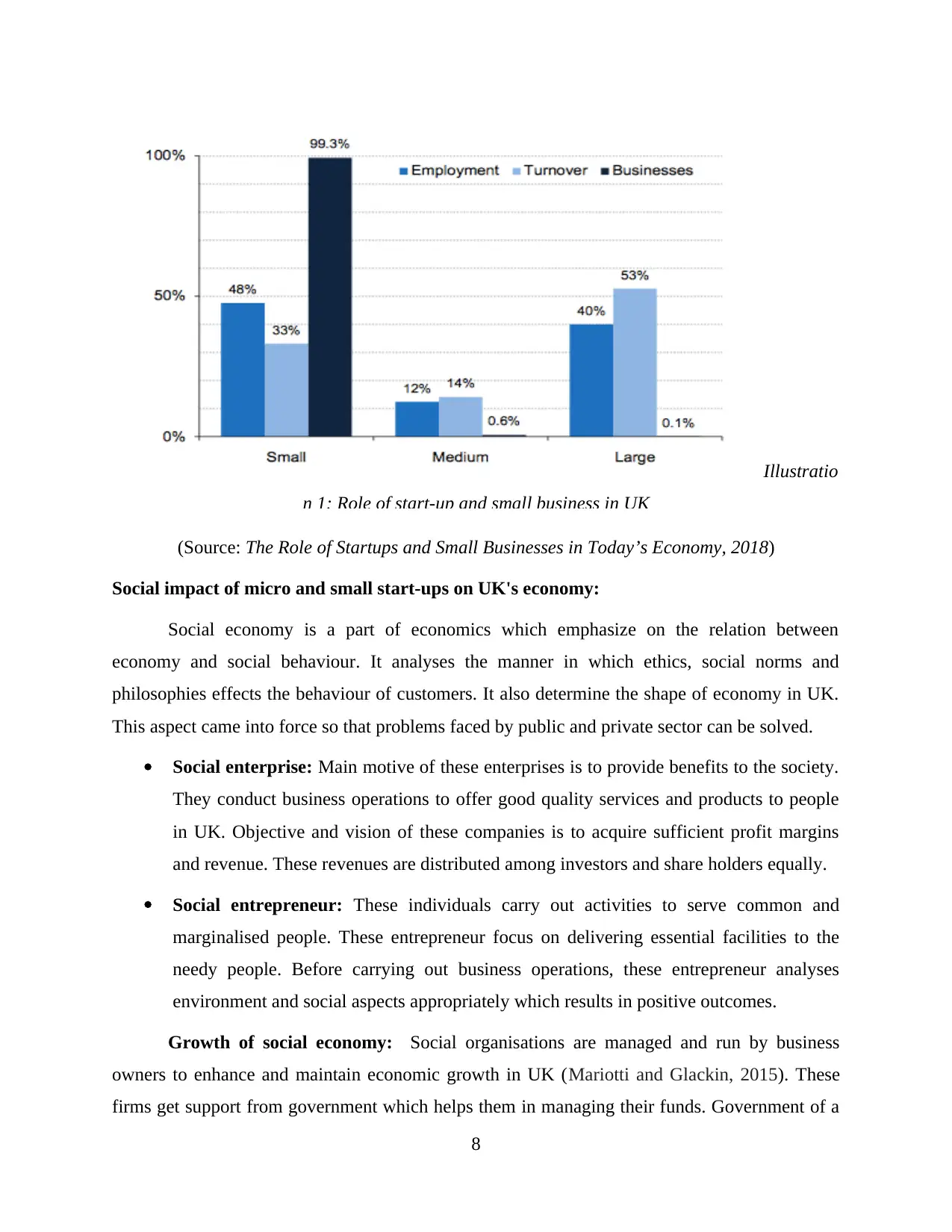
Illustratio
n 1: Role of start-up and small business in UK
(Source: The Role of Startups and Small Businesses in Today’s Economy, 2018)
Social impact of micro and small start-ups on UK's economy:
Social economy is a part of economics which emphasize on the relation between
economy and social behaviour. It analyses the manner in which ethics, social norms and
philosophies effects the behaviour of customers. It also determine the shape of economy in UK.
This aspect came into force so that problems faced by public and private sector can be solved.
Social enterprise: Main motive of these enterprises is to provide benefits to the society.
They conduct business operations to offer good quality services and products to people
in UK. Objective and vision of these companies is to acquire sufficient profit margins
and revenue. These revenues are distributed among investors and share holders equally.
Social entrepreneur: These individuals carry out activities to serve common and
marginalised people. These entrepreneur focus on delivering essential facilities to the
needy people. Before carrying out business operations, these entrepreneur analyses
environment and social aspects appropriately which results in positive outcomes.
Growth of social economy: Social organisations are managed and run by business
owners to enhance and maintain economic growth in UK (Mariotti and Glackin, 2015). These
firms get support from government which helps them in managing their funds. Government of a
8
n 1: Role of start-up and small business in UK
(Source: The Role of Startups and Small Businesses in Today’s Economy, 2018)
Social impact of micro and small start-ups on UK's economy:
Social economy is a part of economics which emphasize on the relation between
economy and social behaviour. It analyses the manner in which ethics, social norms and
philosophies effects the behaviour of customers. It also determine the shape of economy in UK.
This aspect came into force so that problems faced by public and private sector can be solved.
Social enterprise: Main motive of these enterprises is to provide benefits to the society.
They conduct business operations to offer good quality services and products to people
in UK. Objective and vision of these companies is to acquire sufficient profit margins
and revenue. These revenues are distributed among investors and share holders equally.
Social entrepreneur: These individuals carry out activities to serve common and
marginalised people. These entrepreneur focus on delivering essential facilities to the
needy people. Before carrying out business operations, these entrepreneur analyses
environment and social aspects appropriately which results in positive outcomes.
Growth of social economy: Social organisations are managed and run by business
owners to enhance and maintain economic growth in UK (Mariotti and Glackin, 2015). These
firms get support from government which helps them in managing their funds. Government of a
8
Paraphrase This Document
Need a fresh take? Get an instant paraphrase of this document with our AI Paraphraser
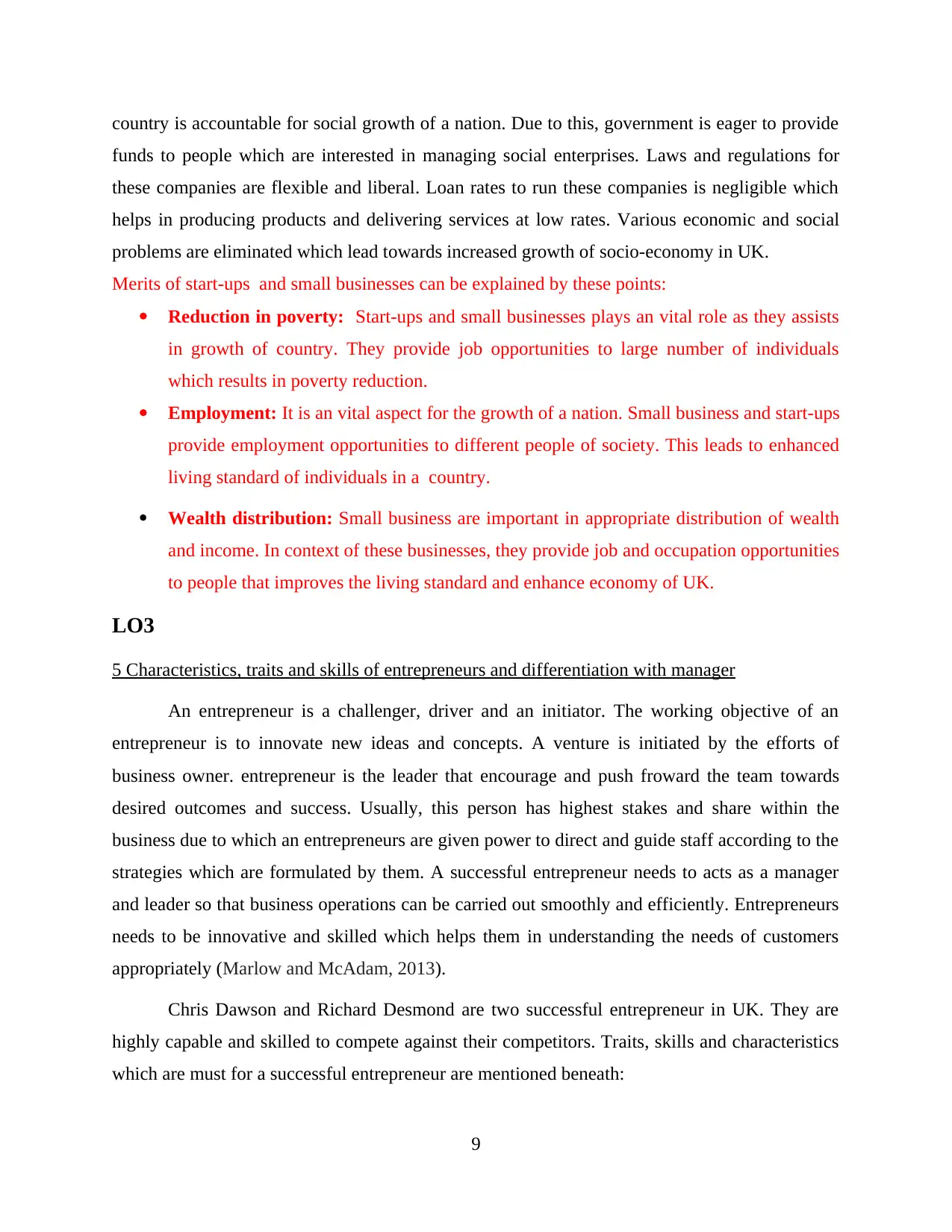
country is accountable for social growth of a nation. Due to this, government is eager to provide
funds to people which are interested in managing social enterprises. Laws and regulations for
these companies are flexible and liberal. Loan rates to run these companies is negligible which
helps in producing products and delivering services at low rates. Various economic and social
problems are eliminated which lead towards increased growth of socio-economy in UK.
Merits of start-ups and small businesses can be explained by these points:
Reduction in poverty: Start-ups and small businesses plays an vital role as they assists
in growth of country. They provide job opportunities to large number of individuals
which results in poverty reduction.
Employment: It is an vital aspect for the growth of a nation. Small business and start-ups
provide employment opportunities to different people of society. This leads to enhanced
living standard of individuals in a country.
Wealth distribution: Small business are important in appropriate distribution of wealth
and income. In context of these businesses, they provide job and occupation opportunities
to people that improves the living standard and enhance economy of UK.
LO3
5 Characteristics, traits and skills of entrepreneurs and differentiation with manager
An entrepreneur is a challenger, driver and an initiator. The working objective of an
entrepreneur is to innovate new ideas and concepts. A venture is initiated by the efforts of
business owner. entrepreneur is the leader that encourage and push froward the team towards
desired outcomes and success. Usually, this person has highest stakes and share within the
business due to which an entrepreneurs are given power to direct and guide staff according to the
strategies which are formulated by them. A successful entrepreneur needs to acts as a manager
and leader so that business operations can be carried out smoothly and efficiently. Entrepreneurs
needs to be innovative and skilled which helps them in understanding the needs of customers
appropriately (Marlow and McAdam, 2013).
Chris Dawson and Richard Desmond are two successful entrepreneur in UK. They are
highly capable and skilled to compete against their competitors. Traits, skills and characteristics
which are must for a successful entrepreneur are mentioned beneath:
9
funds to people which are interested in managing social enterprises. Laws and regulations for
these companies are flexible and liberal. Loan rates to run these companies is negligible which
helps in producing products and delivering services at low rates. Various economic and social
problems are eliminated which lead towards increased growth of socio-economy in UK.
Merits of start-ups and small businesses can be explained by these points:
Reduction in poverty: Start-ups and small businesses plays an vital role as they assists
in growth of country. They provide job opportunities to large number of individuals
which results in poverty reduction.
Employment: It is an vital aspect for the growth of a nation. Small business and start-ups
provide employment opportunities to different people of society. This leads to enhanced
living standard of individuals in a country.
Wealth distribution: Small business are important in appropriate distribution of wealth
and income. In context of these businesses, they provide job and occupation opportunities
to people that improves the living standard and enhance economy of UK.
LO3
5 Characteristics, traits and skills of entrepreneurs and differentiation with manager
An entrepreneur is a challenger, driver and an initiator. The working objective of an
entrepreneur is to innovate new ideas and concepts. A venture is initiated by the efforts of
business owner. entrepreneur is the leader that encourage and push froward the team towards
desired outcomes and success. Usually, this person has highest stakes and share within the
business due to which an entrepreneurs are given power to direct and guide staff according to the
strategies which are formulated by them. A successful entrepreneur needs to acts as a manager
and leader so that business operations can be carried out smoothly and efficiently. Entrepreneurs
needs to be innovative and skilled which helps them in understanding the needs of customers
appropriately (Marlow and McAdam, 2013).
Chris Dawson and Richard Desmond are two successful entrepreneur in UK. They are
highly capable and skilled to compete against their competitors. Traits, skills and characteristics
which are must for a successful entrepreneur are mentioned beneath:
9
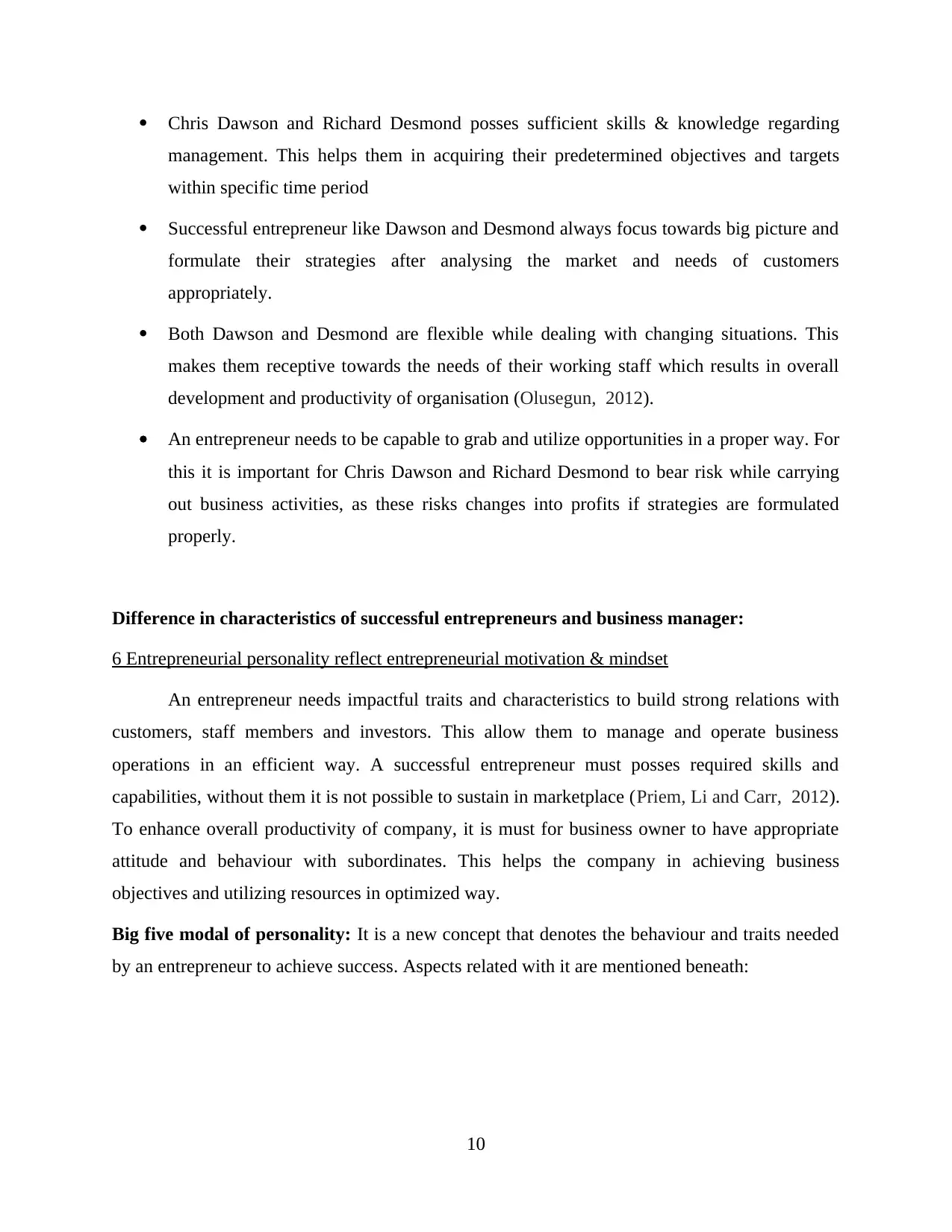
Chris Dawson and Richard Desmond posses sufficient skills & knowledge regarding
management. This helps them in acquiring their predetermined objectives and targets
within specific time period
Successful entrepreneur like Dawson and Desmond always focus towards big picture and
formulate their strategies after analysing the market and needs of customers
appropriately.
Both Dawson and Desmond are flexible while dealing with changing situations. This
makes them receptive towards the needs of their working staff which results in overall
development and productivity of organisation (Olusegun, 2012).
An entrepreneur needs to be capable to grab and utilize opportunities in a proper way. For
this it is important for Chris Dawson and Richard Desmond to bear risk while carrying
out business activities, as these risks changes into profits if strategies are formulated
properly.
Difference in characteristics of successful entrepreneurs and business manager:
6 Entrepreneurial personality reflect entrepreneurial motivation & mindset
An entrepreneur needs impactful traits and characteristics to build strong relations with
customers, staff members and investors. This allow them to manage and operate business
operations in an efficient way. A successful entrepreneur must posses required skills and
capabilities, without them it is not possible to sustain in marketplace (Priem, Li and Carr, 2012).
To enhance overall productivity of company, it is must for business owner to have appropriate
attitude and behaviour with subordinates. This helps the company in achieving business
objectives and utilizing resources in optimized way.
Big five modal of personality: It is a new concept that denotes the behaviour and traits needed
by an entrepreneur to achieve success. Aspects related with it are mentioned beneath:
10
management. This helps them in acquiring their predetermined objectives and targets
within specific time period
Successful entrepreneur like Dawson and Desmond always focus towards big picture and
formulate their strategies after analysing the market and needs of customers
appropriately.
Both Dawson and Desmond are flexible while dealing with changing situations. This
makes them receptive towards the needs of their working staff which results in overall
development and productivity of organisation (Olusegun, 2012).
An entrepreneur needs to be capable to grab and utilize opportunities in a proper way. For
this it is important for Chris Dawson and Richard Desmond to bear risk while carrying
out business activities, as these risks changes into profits if strategies are formulated
properly.
Difference in characteristics of successful entrepreneurs and business manager:
6 Entrepreneurial personality reflect entrepreneurial motivation & mindset
An entrepreneur needs impactful traits and characteristics to build strong relations with
customers, staff members and investors. This allow them to manage and operate business
operations in an efficient way. A successful entrepreneur must posses required skills and
capabilities, without them it is not possible to sustain in marketplace (Priem, Li and Carr, 2012).
To enhance overall productivity of company, it is must for business owner to have appropriate
attitude and behaviour with subordinates. This helps the company in achieving business
objectives and utilizing resources in optimized way.
Big five modal of personality: It is a new concept that denotes the behaviour and traits needed
by an entrepreneur to achieve success. Aspects related with it are mentioned beneath:
10
⊘ This is a preview!⊘
Do you want full access?
Subscribe today to unlock all pages.

Trusted by 1+ million students worldwide
1 out of 17
Related Documents
Your All-in-One AI-Powered Toolkit for Academic Success.
+13062052269
info@desklib.com
Available 24*7 on WhatsApp / Email
![[object Object]](/_next/static/media/star-bottom.7253800d.svg)
Unlock your academic potential
Copyright © 2020–2026 A2Z Services. All Rights Reserved. Developed and managed by ZUCOL.





